- Home
- Clive Barker
Clive Barker's First Tales
Clive Barker's First Tales Read online
FIRST TALES
By CLIVE BARKER
An Otherside Press Production
Otherside Press is an Imprint of Crossroad Press
Digital Edition published by Crossroad Press
Digital Edition Copyright 2013 by Clive Barker & Seraphim Ink
LICENSE NOTES
This eBook is licensed for your personal enjoyment only. This eBook may not be re-sold or given away to other people. If you would like to share this book with another person, please purchase an additional copy for each person you share it with. If you're reading this book and did not purchase it, or it was not purchased for your use only, then you should return to the vendor of your choice and purchase your own copy. Thank you for respecting the hard work of this author.
DISCOVER CROSSROAD PRESS
Visit our online store
Subscribe to our Newsletter
Visit our DIGITAL and AUDIO book blogs for updates and news.
Connect with us on Facebook.
CONTENTS
The Wood on the Hill
The Candle in the Cloud
i – In the Brambles
ii – Hoof Prints in the Night
iii – The Candle is Lit
iv – Darach
v – Maggot-Cloud
vi – The Horseman
vii – Under the Stars
viii – The Beacon
ix – The Queen
x – The Beacon Burns
xi – Siege
xii – Hooves and Arrows
xiii – Hot Air
xiv – Over the Mountains
xv – In the Hall of the Black Wolf
xvi – Desolation's Edge
xvii – The Boy
xviii – Through the Window
xvix – Desolation
xx – Return
Author's Note
These two stories represent the two essential structures of fantastique literature. ’The Wood on the Hill’ is about an incursion of unearthly elements into an approximation of our world. ’The Candle in the Cloud’ is about a journey taken by people from our world into another reality. Yin and Yang, if you like. Forces pulling in opposing directions but to achieve the same end: Revelation.
Clive Barker (2013
The Wood on the Hill
Once upon a time in a land far from here, there grew a wood. This wood was dark and very old for it could remember the times before there were any people on earth, when the sky was always filled with fire, and there lived great birds, more terrible than I have words to tell. It could remember the years when the dragons lived in the valley, until the Great Winter came and they were all driven away by the snow. It was only a small wood then, and a little frightened by the world...
But, by the time I write my story, the wood had grown up, and the people had come to the valley and built cottages where once the dragons had roamed and stomped. It was content, watching the slow passing of the years. The warm summers filled with laughter, the ripe autumns, the cold winters, the springs when the snow melted and hope came again into the world. It watched the children who played in its branches grow to be strong men and graceful women, and, in their turn, have children of their own. It watched the brook grow to a stream, and thus to a rushing river. The years passed peacefully, and each day was a joy greater than the last, for the world was still waking.
Now not all that far from the wood stood a large white house with marble pillars, surrounded by tall yew trees and great gardens, all neatly set out with paths of pink gravel and fountains with cupids in the middle. This house belonged to a Duchess who owned all the land around her house, for she was very rich. It said, on a piece of paper which she always kept locked safely away in a box somewhere, that every leaf, every blade of grass, every flower, bird, animal and tree belonged to her. This pleased the Duchess greatly, because I am afraid she was not a very nice person. In fact, at times her manners were absolutely frightful, and she had a very quick temper. When she flew into a rage, which she did quite often, she would scream at the servants (she had thirty-one) until the windows rattled and the china tinkled. And sometimes, if she was particularly vexed, she would kick the furniture or the footman (whichever was nearby at the time). As if that were not bad enough, she was also exceedingly vain. Sometimes she would spend hours sitting in front of the mirror and looking at herself. I must admit that she was indeed very beautiful, but that did not make her vanity any the less dreadful.
Having told you how horrible the Duchess was at times, you might think that she had no friends. But you would be quite wrong. In fact she had lots of friends, all members of the aristocracy (which means they had lots of money and weren’t quite sure what to do with it). The Duchess’ friends, however, were the most hateful people you could imagine. They were either very fat because they ate too much, or very thin because they would not eat at all, in case they marred their beauty. Beauty! I may truly say that the Duchess’ friends were quite the ugliest people in all the world.
Four times a year at Christmas, on her birthday in April, on Midsummer Night and at Hallowe’en, the Duchess would throw a party, and invite all her friends. Her parties were always wildly successful and were great social occasions. Why they were so successful I cannot possibly imagine, for if you or I were to have gone to one I am sure we would have hated it. All the guests ever did was stand around, talking about the war and the trouble they were having with their servants, and how awful everybody else looked and how boring everybody else’s conversation was. I fancy the Duchess knew in her heart how hateful all the guests were, but still she threw her parties, because it was all she had to do.
Now one day, in late September, when the leaves were just beginning to fall in the wood, the Duchess was out riding on the hills. It was a fine, clear afternoon, and she was thinking about what colour she ought to have her new pet dove dyed. You see, she hated it being so white, because she thought it might make her look less beautiful.
The Duchess was so deep in thought, that she rode further from the house than she had ever ridden before, and the servants were just about to pluck up enough courage to tell her, when, quite suddenly, they found themselves at the foot of the hill whereon grew the wood that I told you about. The Duchess had never seen the wood before, and, calling to her servants to help her dismount, she demanded that she be taken to it. At this the servants muttered to each other under their breath, but they feared the Duchess too much to disobey. So Michael, the oldest one, bowing low, said:
‘As Your Grace commands,’ and led the way up the hill.
The other servants followed some way behind, but finding the Duchess too concerned with the wood to notice their tarrying, they halted half-way up and stood, watching in silence.
The evening was drawing on now, and the wood stood quiet and beautiful, a thousand shades of gold and red. When Michael and the Duchess reached the top of the hill, they found that the wind was quite strong, murmuring through the trees and blowing dead leaves about. The Duchess stood for a moment on the edge of the wood, thinking. Then suddenly, she turned to Michael:
‘This wood! she cried, shattering the stillness, ‘shall hold my next party here. It will be a Hallowe’en party, such as none have ever seen before, and I shall invite everybody.’
Michael was silent.
‘What is it — you miserable old owl?’ the Duchess cried. ‘Is it not a brilliant idea? Everybody else throws their parties in their Grand Halls — oh but not I! No indeed! I shall throw my party here — in the wood on the hill. It will be the greatest celebration the crowd has ever seen.’
‘Tut, your Grace,’ stammered poor old Michael, suddenly frightened, not by the Duchess, but by something much more terrible, ‘— you can’t
!’
‘Can’t?’ cried the Duchess.
‘Can’t??’ screamed the Duchess.
‘Can’???’ exploded the Duchess.
‘Why can’t I?’
‘Well. .’ the old man halted, ‘well . . . because. ..’
‘What?’
‘It’s haunted, m’am.’
‘Haunted?’ the Duchess said quietly, her anger suddenly gone. ‘Haunted?’ repeated the Duchess slowly, and looked at the wood through her spectacles, as if she were looking for the ghosts. ‘Really?’ she said after a moment. ‘Haunted, eh? How quaint!’
(Which was a very silly thing to say, but then again, as I have explained, she was a very silly Duchess.)
‘How quaint! she said again, ‘Ha! I do . . . er . . . so love . . . er . . . these peasant superstitions.’
Michael shook his head sadly. But the Duchess wasn’t looking. She was far too busy talking to herself and making plans.
‘It will be the social event of the decade,’ she said excitedly. `Everybody who is anybody will be there. And it’s all so original. Nobody has ever had a ball in the middle of a wood before. I shall be the toast of society for absolutely ages. Oh, why am I so clever? It just isn’t fair on the rest of the world!’
She turned to Michael.
‘Find the best woodcutters in the country, do you understand?’
‘Woodcutters, Your Grace?’
‘Yes fool. I want a large clearing cut in the middle of the wood. .
‘What?’ cried Michael, his eyes wild with anger and fear, ‘You’re planning to chop down part of the wood?’
‘Of course, replied the Duchess, ‘I’m not going to have my guests dangling from the branches like apes!’
‘But you can’t! You mustn’t. The wood isn’t yours.’
‘Isn’t mine?’ the Duchess laughed. ‘Of course it’s mine. I own all this.’ ‘Yes,’ said Michael slowly, you own it all as far as lawyers and pieces of parchment are concerned . . . But —’
‘But what?’
‘Oh, Your Grace, the wood isn’t — yours. I mean, it is yours legally — but there are others-’
‘Who?’ snapped he Duchess.
‘Just others,’ the old man replied, avoiding the Duchess’ eyes, his hands shaking with fear.
‘You’re speaking nonsense, you old bat. You’re mad.’
‘Very well then, Your Grace, I am mad. But still —’
‘Still nothing. You will do as I say or I’ll have you hanged for your silly ramblings.’
Michael had no choice but to nod meekly.
Well, he thought to himself, what more can I do? It is foolish to meddle with such things, but I can do nothing. What happens now is not my fault.
Then the sun slipped behind the horizon, and darkness fell. Suddenly, the beautiful trees became strangely menacing in the half-light, looming grey and huge above the Duchess and the bowed figure of Michael. The night was upon them, and they were far from home.
‘Come —,’ said the Duchess hurriedly, for she was a little unnerved by this strange transformation. ‘Let us return.’
As they walked down the hill Michael smiled a little to himself. Not a happy smile, you understand, but a resigned smile of one who knows what is about to happen, and who also knows that he may do nothing about it.
Even if the Duchess was vain, she was certainly no coward, and once she had an idea in her head she flatly refused to let it go. So, although she still had a few lingering doubts about the woods, she was nevertheless resolved to throw her party there. She had long since convinced herself that there was nothing to fear. Well, nothing a bonfire and an orchestra would not cure. Thus, the preparations began.
Invitations written in the finest copper-plate were sent to all the neighbouring lands, with the words:
The Duchess
Requests the pleasure of your company
at a grand Halloween Ball
on October 1st
R.S.V.P.
Meanwhile, in the woods, the clearing was being made, the bonfire piled up, the tables set out, the entertainers rehearsed and a thousand and one other arrangements made. All kinds of people, each with his or her separate task, and each believing that their job was the most important, and that they were working the hardest.
Hallowe’en grew nearer. In the house, the Duchess was busy picking off names on her guest list and ordering wine and food. One morning, about a week before Hallowe’en, the old sorcerer who had been ordered to make the fireworks arrived with his creations, arms full of brightly- coloured squibs and rockets and ripraps and Catherine wheels and Roman candles and dragon-flames and snow-flowers and some that even he had not got a name for, because he didn’t know what they would do. When he heard where the Duchess was planning to hold her party, however, he became most upset.
‘The woods?’ he exclaimed in alarm, dropping the fireworks everywhere, ‘but that is forbidden!’
‘By whom?’ the Duchess demanded angrily. ‘Who forbids it?’
‘They do. Those who own it. It is most foolish to hold your party there. It will be a failure!’
At this the Duchess flew into a rage. How dare this tatty old magician suggest one of her parties might be a failure! The arrogance of the fellow!
`Old man!’ she screamed, ‘I suggest you take that remark back. I have but to snap my fingers and you will die.’
‘Oh,’ said the sorcerer, undisturbed by the Duchess’ tantrums.
‘Cower in fear, idiot! I threaten you with a death so horrible that men will talk of it a hundred years hence! I repeat myself — take that remark back!’
‘Shan’t,’ said the sorcerer, and yawned.
‘Why you — Guards! Guards! Seize him!’
‘I think not,’ the sorcerer said calmly, and disappeared in a puff of smoke. By the time the guards arrived, therefore, the room was empty save for the Duchess, still quivering with anger and a few dead leaves that the sorcerer had left on the carpet where he had worked. But long after he had gone, the Duchess could hear his soft laughing, and in the end she ordered the room to be locked up and never to be entered again.
Well after that, as you might have guessed, the Duchess began to doubt the cleverness of her plan, and regret her decision. But by that time it was far too late. All the guests had been invited. The wine and the food ordered. The masks and fireworks made. There was nothing she could do.
On the morning of October 31st, the Duchess woke after a terrible nightmare in which she had been chased by something she could not see, through a forest in which the trees were as big as mountains, or else she was the size of a butterfly, one of the two. And in the dream she had met all of her friends, the ones I told you about, only they had become monstrously misshapen and horrid. First she had met Lady Boswell-Humphries, who had apparently swapped bodies with a pig because that way, she said, she could eat more. Beside her, sitting on a toadstool, was the Admiral’s wife, whose head was slowly turning into a gramophone, her nose becoming the huge black horn. Further along she came upon the Archbishop, dangling from a convolvulus, and trying, so he explained, to fly.
She saw the Marquis’ wife too, who had become a spider during the night and was busy drinking the blood of the peasants that had become trapped in her dark web. But worst of all was the General, whom the Duchess discovered in the blackest part of that terrifying forest, trampling on beautiful white flowers and muttering `tut-tut, terrible waste,’ to himself as he did so.
His head was bowed so the Duchess could not see his face until he looked up at her. But when he did the Duchess collapsed to the cold ground in a dead faint, for she saw with horror that he no longer had a face, but had instead, a grinning skull with no eyes, white in the darkness of that forest.
At that moment the Duchess had woken from her nightmare to find that the sun was streaming through her window, and there were birds singing in the yew tree outside. The day could not have been nicer. Dismissing her nasty dream as the result of something that had disag
reed with her, and making a mental note to sack the cook, she got dressed and went downstairs.
She was too excited for any breakfast, or lunch, or tea, and spent the morning making a few final adjustments to her hair and then, in the afternoon, having a long, warm bath and getting dressed. She had a beautiful gown, which had been made by a hundred seamstresses especially for the occasion. It was the colour of a silver birch, and was stitched with thread of gold. As evening approached, and the shadows lengthened, she boarded her golden coach and, with her servants riding close behind, was driven to the woods.
By the time she reached the hill, the sun had almost set. The wood looked rather as it had that first day, five months ago, when she and Michael had climbed the windy hill. But now, she thought to herself, there was something different about it. It seemed, somehow, darker. She shivered for a moment, though the evening was not cold. Then, putting on her mask, which was a beautiful, intricate design of silver leaves, she made her way between the trees to the clearing, ready to receive her first guests.
Over five hundred guests had been invited to that party, and every single one of them came. Thus, by ten o’clock the clearing was filled with people, all talking or drinking or eating or dancing or laughing or trying to do all those things at the same time. The noise was dreadful. What with the fireworks, the guests and the orchestra playing, the party must have been heard miles away.
Outside the wood, in the white moonlight, the footmen and servants and coach-drivers sat and listened to the assorted sounds of laughter and merry-making, and looked up occasionally from their card-games to catch a glimpse of the bonfire or the fireworks between the trees. The horses all seemed strangely uneasy. They shuffled and neighed and some whimpered in the way horses do. But the coach-drivers merely went on playing cards and envying their masters.

 The Great and Secret Show
The Great and Secret Show Coldheart Canyon: A Hollywood Ghost Story
Coldheart Canyon: A Hollywood Ghost Story Galilee
Galilee Cabal
Cabal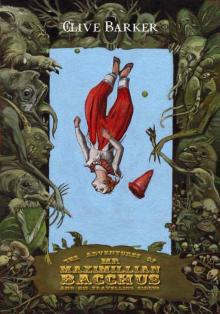 The Adventures of Mr. Maximillian Bacchus and His Travelling Circus
The Adventures of Mr. Maximillian Bacchus and His Travelling Circus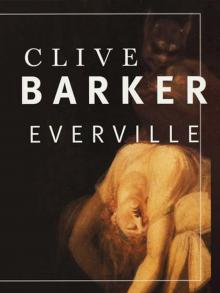 Everville
Everville Books of Blood: Volume Three
Books of Blood: Volume Three Weaveworld
Weaveworld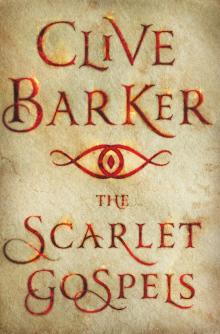 The Scarlet Gospels
The Scarlet Gospels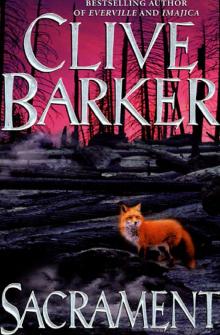 Sacrament
Sacrament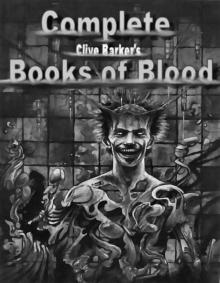 Books of Blood: Volumes 1-6
Books of Blood: Volumes 1-6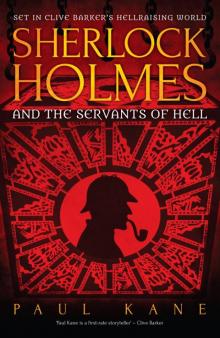 Sherlock Holmes and the Servants of Hell
Sherlock Holmes and the Servants of Hell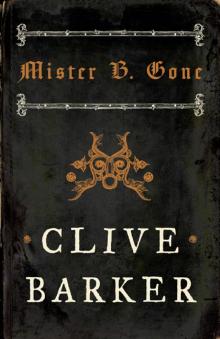 Mister B. Gone
Mister B. Gone Imajica
Imajica The Reconciliation
The Reconciliation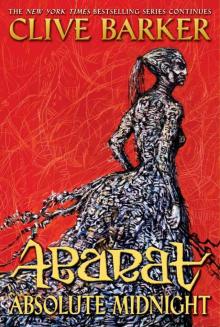 Abarat
Abarat Clive Barker's First Tales
Clive Barker's First Tales The Hellbound Heart
The Hellbound Heart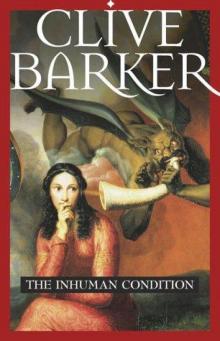 The Inhuman Condition
The Inhuman Condition Infernal Parade
Infernal Parade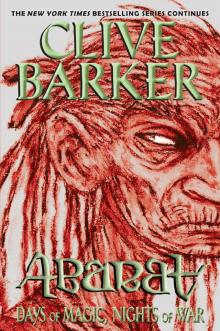 Days of Magic, Nights of War
Days of Magic, Nights of War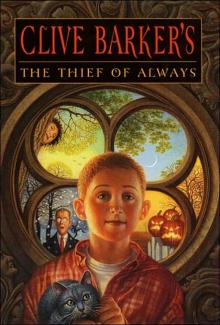 The Thief of Always
The Thief of Always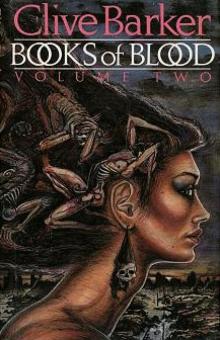 Books of Blood Vol 2
Books of Blood Vol 2 The Essential Clive Barker
The Essential Clive Barker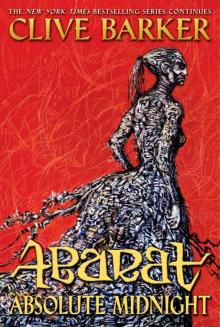 Abarat: Absolute Midnight a-3
Abarat: Absolute Midnight a-3 The Damnation Game
The Damnation Game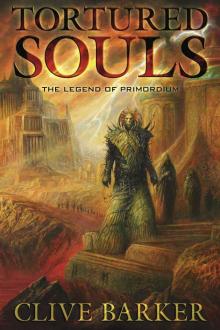 Tortured Souls: The Legend of Primordium
Tortured Souls: The Legend of Primordium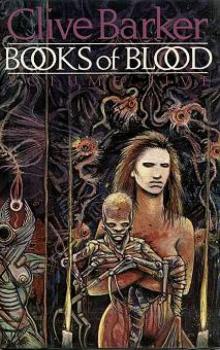 Books of Blood Vol 5
Books of Blood Vol 5 Imajica 02 - The Reconciliator
Imajica 02 - The Reconciliator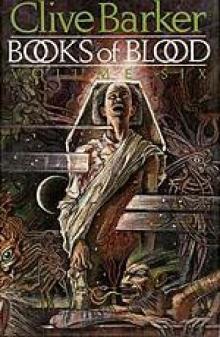 Books Of Blood Vol 6
Books Of Blood Vol 6 Imajica 01 - The Fifth Dominion
Imajica 01 - The Fifth Dominion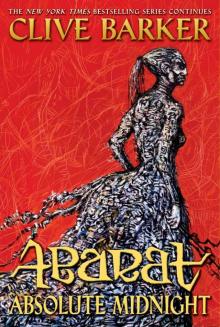 Abarat: Absolute Midnight
Abarat: Absolute Midnight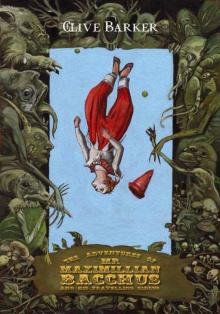 The Adventures of Mr. Maximillian Bacchus & His Traveling Circus
The Adventures of Mr. Maximillian Bacchus & His Traveling Circus Tonight, Again
Tonight, Again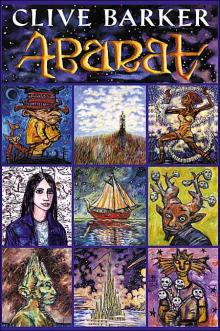 Abarat: The First Book of Hours a-1
Abarat: The First Book of Hours a-1 Books Of Blood Vol 1
Books Of Blood Vol 1 Age of Desire
Age of Desire Imajica: Annotated Edition
Imajica: Annotated Edition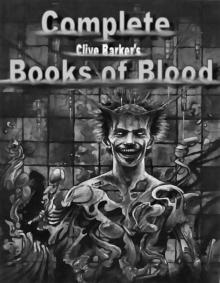 Complete Books of Blood
Complete Books of Blood Gutted: Beautiful Horror Stories
Gutted: Beautiful Horror Stories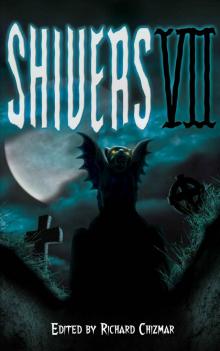 Shivers 7
Shivers 7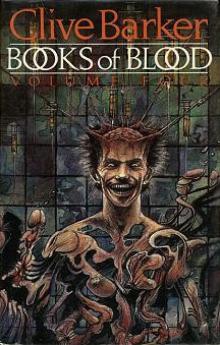 Books Of Blood Vol 4
Books Of Blood Vol 4